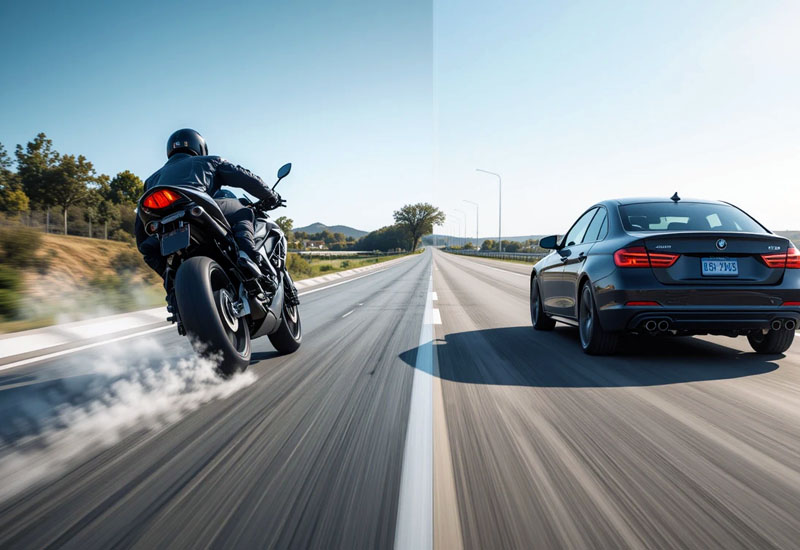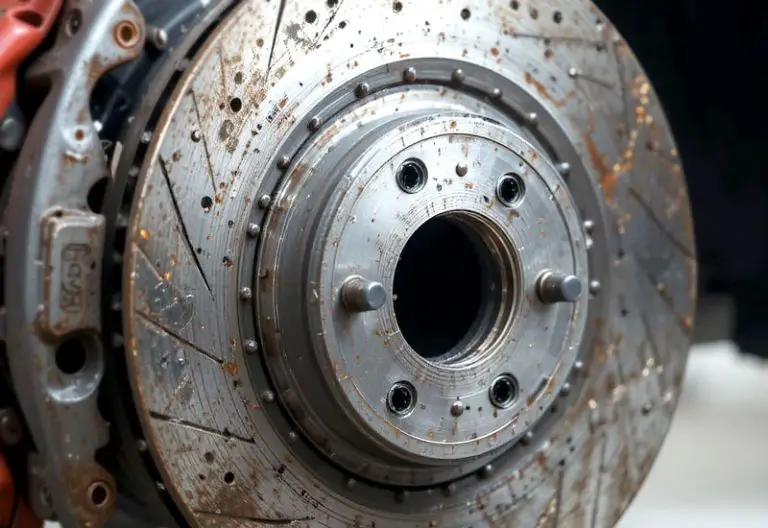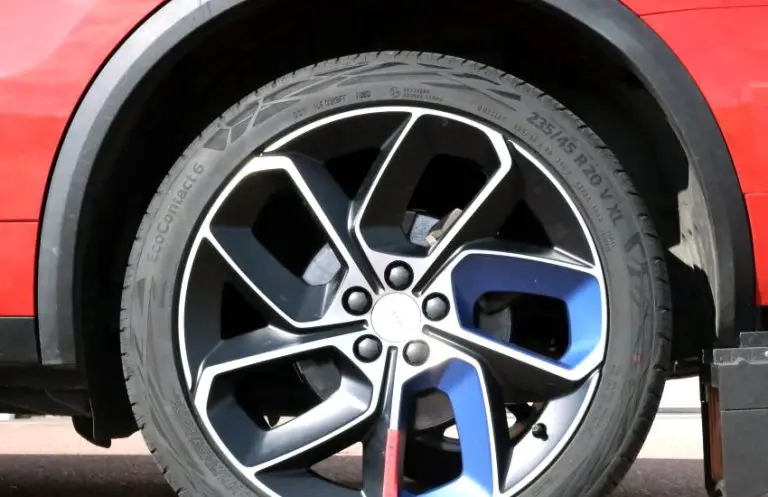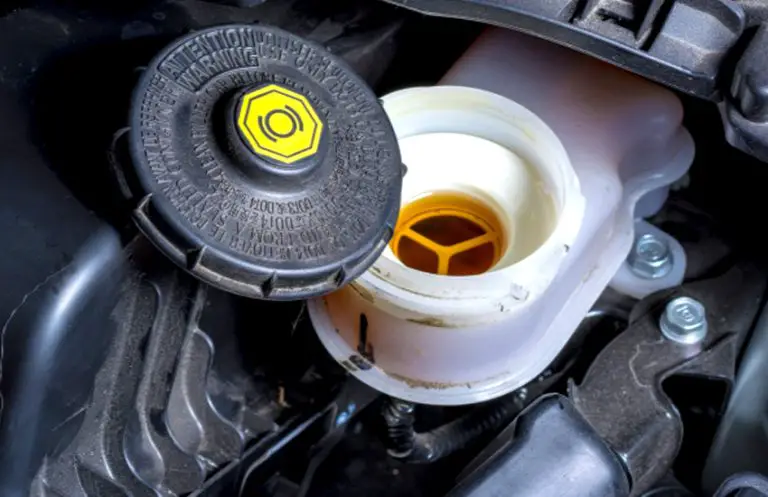When you think about speed, agility, and quick reflexes, motorcycles probably come to mind, right? But what about their braking abilities? Are motorcycles quicker at stopping than cars? Let’s dive deep into the world of braking and find out which is truly better when it comes to halting on a dime.
The Physics Behind Motorcycle and Car Braking
What Makes a Motorcycle Stop Faster?
Before we get into which vehicle has the best braking abilities, let’s take a quick look at the science of braking. Whether you’re on a motorcycle or in a car, the basic idea behind braking is the same: applying force to stop a moving object. The key difference lies in the dynamics at play.
Motorcycles tend to have an edge when it comes to quick stops. This is mainly due to their lighter weight compared to most cars. The force needed to stop a motorcycle is generally lower than what’s required to stop a car, simply because there’s less mass. When a motorcycle slams on the brakes, it can bring itself to a halt much quicker, especially if the rider knows what they’re doing.
But hold on—there’s more! Braking isn’t just about weight. Traction and friction play a massive role. On a motorcycle, the tire contact area is smaller than on a car, meaning the friction from the tires must work extra hard to stop the vehicle. However, the lighter weight means this force is more easily overcome, leading to a quicker stop under the right conditions.
Why Do Cars Take Longer to Stop?
Cars, on the other hand, weigh significantly more. The heavier the vehicle, the more force you need to stop it. It takes more time and energy to bring a car to a complete stop. The braking system in a car is designed to handle that weight, but it also means that in an emergency situation, cars generally need more distance to stop, especially at high speeds.
A car’s larger contact patch with the road gives it more friction, but the increased weight works against it in terms of speed. Plus, the typical car’s braking system (even with modern features like ABS) isn’t as quick as the brake system of a well-maintained motorcycle.
So, what’s the bottom line? On a basic level, motorcycles, with their light weight and efficient braking systems, have the edge when it comes to quick stops, but there are several other factors to consider.

How Weight Affects Braking Distance in Motorcycles and Cars
Lighter Equals Faster Stops for Motorcycles
One of the biggest factors in braking distance is weight. Simply put, the heavier a vehicle, the more energy it takes to stop it. So, since motorcycles are generally much lighter than cars, they require less energy to stop. In an emergency braking situation, a lighter motorcycle can stop in a much shorter distance than a heavier car.
Think of it like trying to stop a heavy shopping cart compared to a lightweight scooter. The scooter is going to come to a halt much quicker because it’s easier to control, and it doesn’t have that extra weight to deal with. The same principle applies when comparing motorcycles and cars.
How Car Weight Affects Braking Performance
The weight of cars, especially larger ones, significantly impacts how long it takes to stop. The heavier the car, the more distance is needed to safely bring it to a stop. This is true even if the car is equipped with the latest braking technology.
When driving at high speeds, the difference in braking distances between cars and motorcycles becomes even more pronounced. For example, at 60 mph, a motorcycle might stop in as little as 120 feet, whereas a car could need 160 feet or more, depending on its weight and braking system.
The Role of Tires in Braking Efficiency
Tire Size and Grip for Motorcycles
Motorcycle tires are relatively narrow compared to car tires, which means there’s less surface area in contact with the road. However, the rubber compounds used in motorcycle tires are designed for maximum grip, especially when braking. This provides great stopping power, especially in dry conditions.
Motorcycle tires are also much lighter and smaller, so they can stop more quickly, but that also means they are more sensitive to road conditions like wet pavement or gravel. On a slippery surface, even the best motorcycle tires might struggle to stop as quickly as they would on a dry road.
Car Tires: A Bigger Contact Patch Means More Grip
Cars, on the other hand, have wider tires that create a larger contact patch with the road. This larger patch provides more traction, which helps the car stop more effectively under many conditions. However, a car’s larger contact patch doesn’t necessarily mean it’s going to stop faster—it’s all about how much friction the tire can create with the road. The heavier the car, the more friction needed to bring it to a stop.
The type of tire on both vehicles plays a crucial role. A car with high-performance tires or a motorcycle with advanced racing tires can significantly improve braking performance, but still, the general rule is that lighter vehicles (motorcycles) often have the advantage when stopping at high speeds.
Differences in Braking Technology: Disc Brakes vs. Anti-lock Braking Systems (ABS)
Motorcycle Brakes: Simple and Effective
Motorcycles typically come equipped with disc brakes, which are highly effective for quick stopping. These brakes work by using friction to slow down the rotation of the wheel, but the rider’s technique is also very important. Properly using the front and rear brakes together is crucial to stopping quickly and safely.
Many modern motorcycles also come equipped with ABS (Anti-lock Braking System), which prevents the wheels from locking up in emergency braking situations. ABS is a huge advantage, especially for riders who are still learning or in less-than-ideal conditions. It allows them to maintain control and stop safely without skidding.
Car Brakes: Advanced Systems for Heavy Vehicles
Cars also have disc brakes, but they usually come with more advanced systems like ABS, traction control, and even automatic emergency braking. These systems work together to keep the car in control, especially when trying to stop suddenly.
While ABS is great for helping a car maintain control in slippery conditions, it can also contribute to a longer stopping distance in some situations. In high-performance situations, such as during emergency braking, a car with ABS may not stop as quickly as a motorcycle without ABS, but it certainly provides more safety and stability for the driver.
Rider Skill and Control: How Does Experience Influence Motorcycle Braking?
The Importance of Technique for Motorcycle Riders
While motorcycles can stop more quickly due to their lighter weight and powerful brakes, a lot of this is dependent on the rider’s skill. An experienced rider can bring a motorcycle to a stop much faster than a beginner who may not know how to properly apply the brakes.
In fact, braking is an essential skill for any motorcycle rider. If the rider uses both the front and rear brakes effectively and applies them smoothly, they can achieve quicker and safer stops. On the other hand, over-braking or locking up the front wheel can lead to a loss of control, especially in emergency situations.
Car Drivers: Less Skill-Dependent, But Still Important
When it comes to cars, drivers are still required to know how to brake properly, but the skill factor isn’t as significant as it is on motorcycles. Modern car braking systems are designed to be very user-friendly, and drivers don’t need as much training to stop quickly. However, like motorcycles, the more experience a driver has, the better they can handle emergency braking situations.
Braking in Emergency Situations: Comparing Real-World Performance
Motorcycle Braking in Emergency Scenarios
In an emergency situation, motorcycles generally have the advantage. The light weight, combined with the rider’s ability to control the bike, means that motorcycles can often stop much quicker. A skilled rider who knows how to use the front and rear brakes together can achieve impressive stopping power, even at higher speeds.
However, motorcycles are not without their risks. In bad weather conditions or on slippery surfaces, a motorcycle can be more difficult to control during an emergency stop. Without ABS, there is a higher chance of the bike skidding, and that could lead to a loss of control.
Car Braking in Emergencies
Cars are equipped with systems like ABS and stability control to prevent loss of control in emergency situations. These features are designed to make cars safer during quick stops, but the added weight means that they usually take longer to stop. However, cars offer a lot more protection during a crash, thanks to features like airbags and crumple zones.
In general, a motorcycle may stop faster in an emergency, but a car offers more overall safety, particularly in crash scenarios.
I hope this article has helped clear up the debate about which vehicle stops quicker—motorcycles or cars. The answer isn’t always straightforward, but motorcycles tend to have an edge in quick braking due to their lighter weight and powerful braking systems. However, cars have their own set of advantages, especially in terms of safety and stability during an emergency stop. Ultimately, it all comes down to the situation, the vehicle, and the skills of the person behind the wheel or handlebars.
Frequently Asked Questions
Is it easier to stop a motorcycle than a car?
Yes, motorcycles are generally easier to stop due to their lighter weight, but it depends on various factors like road conditions and rider skill.
Can motorcycles stop faster in all conditions?
Motorcycles may stop faster in ideal conditions, but in slippery or wet conditions, motorcycles can be harder to control during a stop.
Do I need ABS on a motorcycle for quick braking?
While ABS helps improve control, experienced riders can still brake effectively without it. However, ABS adds safety, especially in emergency situations.
Is it possible for a car to stop faster than a motorcycle?
In general, cars take longer to stop because of their heavier weight, but advanced braking systems like ABS can help improve their stopping power.
Can weather conditions affect motorcycle braking?
Yes, weather conditions like rain, ice, or snow can greatly affect a motorcycle’s braking performance, making it harder to stop quickly.
Do I need special training to brake quickly on a motorcycle?
Yes, proper training and experience are essential for safely and effectively braking quickly on a motorcycle.
Is it safer to brake quickly on a motorcycle than a car?
While motorcycles can stop quickly, cars offer more protection in the event of a crash, making them safer in some situations.
Can a car’s braking system be upgraded to perform better?
Yes, many high-performance cars can be upgraded with better braking systems like larger rotors or sport brakes to improve stopping distance.


